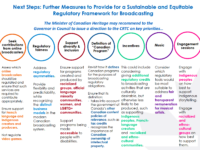The Broadcasting Act blunder series has featured several posts raising concerns that Bill C-10 is likely to increase costs for consumers and decrease choice as some services block the Canadian market altogether. Canadian Heritage Minister Steven Guilbeault has regularly cited the situation in Europe as evidence that the concerns are unfounded. For example, he told the House of Commons that “European Union has adopted new rules on streamers resulting in increased investment, jobs, choice of content and ability to assert one’s own cultural sovereignty” and told the media that the European Union has had a requirement since 2018 that 30% of Internet streaming services content must be European content without resulting in higher fees.
Guilbeault’s comparison of Bill C-10 to the situation in Europe is misleading at best.











